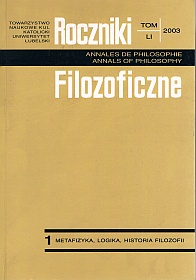Philo of Alexandria – Introduction
Abstract
The aim of this article is to give a comprehensive introduction to the philosophical thought of Philo of Alexandria, a Jewish exegete of Scripture who was born and lived in Alexandria between ca 15-10 BC – 45-50 CE. The main part is preceded by short remarks concerning the state of research on Philo in Poland, Philonic nomenclature, his life and works. Then Philo's philosophy is examined, with special reference to its sources (Jewish and Greek), the conception of God, Logos, and other intermediaries, Philo's view of the world, man and ethics (including here the notions of assimilation to God, virtue, ideal of sage, freedom, conscience, contemplation of God and life after death) and Philo's influence on Gnostics, Middle Platonists and Church Fathers. Each issue is supported by references to Philo's works and placed in the context of scholarly discussion. The author puts forward his view that Philo's philosophical originality primarily consists in harmonizing Jewish and Greek tradition, and, as a result, re-interpreting them both in a thoroughly new manner. Accordingly, Philo can be regarded as the main predecessor of the patristic and medieval quest for synthesis of faith and reason. The bibliographical part includes main editions and translations of Philo's treatises including also scholarly literature not mentioned in the text. At the end the general bibliography as well as the bibliographies on Philo are given.
Copyright (c) 2003 Roczniki Filozoficzne

This work is licensed under a Creative Commons Attribution-NonCommercial-NoDerivatives 4.0 International License.





